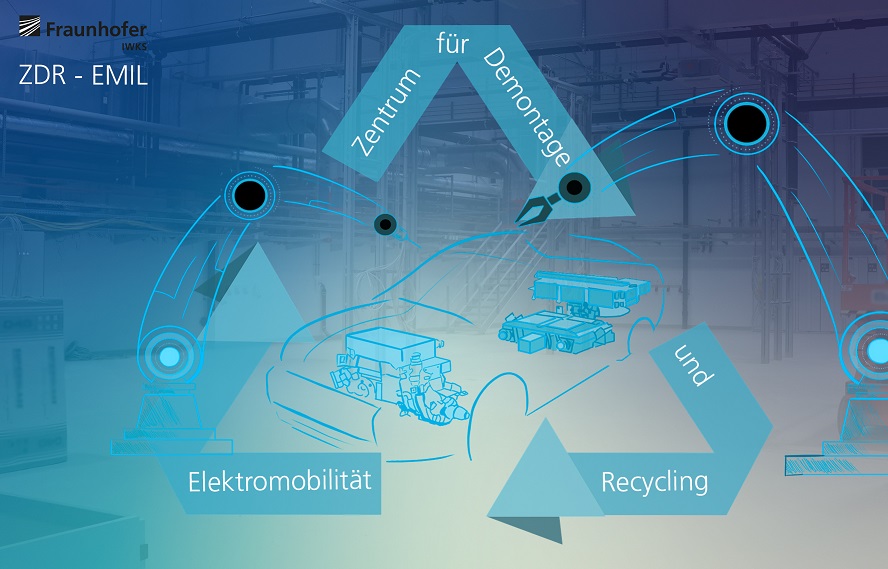Fraunhofer IWKS establishes Center for Dismantling and Recycling for Electromobility in Hanau

In Germany and beyond, electromobility is an essential component of the energy transition and an important topic for the industry. In addition to further development in manufacturing, the recycling of valuable resources and the reduction of the ecological footprint of electronic vehicles are of decisive importance in order to make a sustainable contribution to climate goals.
This is precisely where the Fraunhofer Research Institution for Materials Recycling and Resource Strategies IWKS comes in. Together with partners from industry and research, it develops sustainable processes for the complete recycling of components in electric vehicles. Since the founding of Fraunhofer IWKS in 2011, its research at the Hanau site has focused on the recycling and reuse of functional materials from high-performance magnets and energy conversion systems, which are key components of e-mobility. As a consistent technological development of Fraunhofer IWKS at its Hanau location, a sustainable Center for Dismantling and Recycling - Electromobility (German: Zentrum für Demontage und Recycling – Elektromobilität ZDR-EMIL) has been established as part of Fraunhofer IWKS since April 2020 and made available to regional companies from Hesse. The new center is supported by the Hessen State Ministry for Higher Education, Research and the Arts.
"With the ZDR-EMIL, automated and flexible dismantling and recycling processes are developed for all components of electric vehicles. In cooperation with regional industry partners, we can achieve a high level of recycling efficiency with regard to economic aspects, resilience and sustainability," explains Dr. Jörg Zimmermann, project manager of ZDR-EMIL. "It is important in our approach that we recover all materials. This includes the valuable critical metals, but also construction materials such as plastic, aluminium and steel, which are contained in far higher quantities. This avoids landfilling and dissipation." For an efficient and ecologically sensible implementation, it is necessary to align processes to the respective needs of companies, depending on existing infrastructures, targeted processing depth, investment framework and strategic partners. Thus, the industry can benefit from the infrastructure and know-how of Fraunhofer IWKS in the implementation of sustainable material cycles in electromobility.
"All natural resources on our planet are finite. It is therefore one of our central future tasks to deal with materials and resources in a sustainable manner. This is particularly true for electromobility: Here we urgently need to significantly increase the service life of batteries and improve battery recycling. With the Hanau Center for Dismantling and Recycling - Electromobility, the scientists at Fraunhofer IWKS will have even better research conditions for this. Hesse is thus helping to secure raw materials and establish a geopolitically independent material cycle for the development and production of high-tech components in Germany and Europe. We are happy to support this," says Angela Dorn, Hessian Minister of Higher Education, Research and the Arts.
Efficient recycling management for electromobility
The ZDR-EMIL establishes an efficient recycling management for functional components of electromobility, such as batteries, fuel cells, power electronics and magnets from electric motors from dismantling to re-use and recycling. The focus is on automated safe dismantling as well as sustainable mechanical and hydromechanical treatment methods and selective fragmentation, which enables the recycling of all product components. Here, Fraunhofer IWKS builds on its many years of expertise in resource research. As an applied research institution, the scientists at Fraunhofer IWKS always have the entire process in view and evaluate it with regard to ecological and economic aspects: Only when a direct recycling in the sense of re-use and repair of the functional components is technically no longer possible, functional recycling, i.e. the recovery of functional materials or the recovery of precursors for the synthesis of new material, is applied. The aim is to produce high-quality recyclates as new secondary raw materials in as few process steps as possible. In the ZDR-EMIL, modular and flexible demonstrators are built up operationally, which enable tailor-made recycling processes. The processes will be robot-supported and automated to ensure that the functional recycling processes are also economically viable in Germany. In this respect, ZDR-EMIL offers added value for the established companies and thus improved synergies.
The Fraunhofer Research Institution for Materials Recycling and Resource Strategies IWKS has been established since 2011/2012, initially as a project group of the parent institute Fraunhofer ISC in Würzburg at the two locations Hanau (Hesse) and Alzenau (Bavaria). Since April 2019, it has been an independent Fraunhofer Institute headed by Prof. Dr. Anke Weidenkaff. ZDR-EMIL is a decisive part of the further development of Fraunhofer IWKS as a leading contact for industry in matters of recycling and recycling management.
Scientific contact:
Dr. Jörg Zimmermann (Project Manager ZDR-EMIL)
Fraunhofer Research Institution for Materials Recycling and Resource Strategies IWKS
Phone +49 6023 32039-875
joerg.zimmermann@iwks.fraunhofer.de
Duration:
01.04.2020 – 31.03.2023
Funded by:
Hessen State Ministry for Higher Education, Research and the Arts